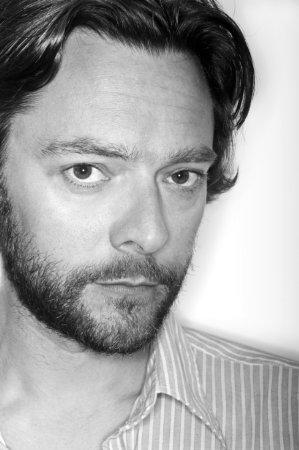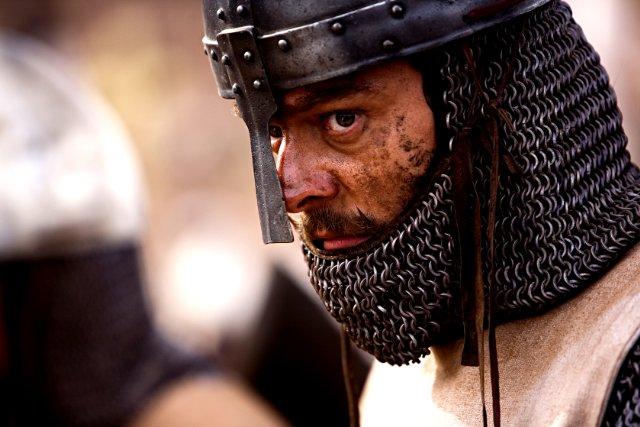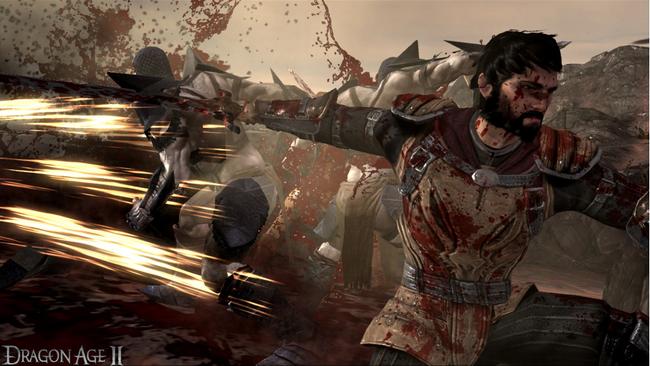
Nicholas Boulton Interview
Dragon Age II, sequel to the phenomenally popular Dragon Age: Origins, is easily one of the most anticipated RPGs of the year and the first major RPG release of the year on home consoles. Shortly before its arrival in all our homes, we had a chance to chat with the talented voice actor behind the male version of the game's lead character Hawke about his work on the series and his career at large.

RPGSite: Hi Nicholas, thanks for joining us. How are you today?
Nicholas Boulton: Very well, thank you for asking!
RPGSite: Looking online, it seems like you made your on screen début roughly seventeen years ago but when did you first start acting - when did the theatre bug first bite?
Nicholas: I must have been about six or seven years old in my first school play, “The Merchant of Baghdad”, playing a pedlar in harem pants (well before MC Hammer got the idea) – I was instantly addicted to the magic of theatre. The feelings I experienced then were very similar to those I feel now whenever I work on stage: waiting in silence backstage, listening to the buzz of the settling audience during those nerve-wracking moments before the lights go down, trying not to think of all the things that might go wrong. Deep breath in and out. Lights up. Then that mysterious change that takes place as cast and audience are (if everyone’s done their job well) teleported to another reality. There’s nothing quite like it.
RPGSite: You are one of the few actors we have spoken to that attended drama school, so what memories do you have of your time there and do you feel it helped your career?
Nicholas: I was lucky enough to land a place at The Guildhall School of Music and Drama, one of the top drama schools in the country: Daniel Craig and Ewan McGregor are just two of the success stories from my peer group. The three years of training I had there were invaluable: it was an environment that enabled one to safely explore the different directions one could take in what is a pretty hazardous choice of career, in the company of some very talented people and some of the best teachers in the country/world. It also helped me to get my agent and my first job – two milestones in a new actor’s career that can be very hard to achieve.
RPGSite: Since then you have found success in practically every field of acting, but what were your hopes and expectations for your career when you first started out?
Nicholas: I suppose anyone starting out in life may fantasize about achieving extraordinary success in whatever field they have chosen, and the rewards that go with that – fabulous wealth, private jets, luxury homes all over the world, a lifetime supply of baked beans and your own toast factory. Personally, I can’t deny having had the odd superstar daydream but what mattered more to me then, as now, was to seize opportunities as they came and see where they led, and they have certainly led to some very interesting and unexpected places: doing Chekhov in a warehouse in King’s Cross, galloping in chain mail through the foothills of the Atlas Mountains, and training office workers in Chongqing, China, to name but a few. Fame has its price, however, and I’ve nowhere to keep the beans anyway.
RPGSite: Your first success came from your work on radio. Is that an area you have a particular interest in or was it just another job, albeit one that happened to go well?
Nicholas: BBC Radio has been very good to me. In my last year at drama school I hit the radio jackpot when I won a prize called the BBC Radio Carleton-Hobbs Award. The prize consisted of a seven month contract with the RDC (Radio Drama Company) playing some extremely diverse roles. When the contract came to an end, the work, thankfully, did not and the BBC has continued to offer me fun and challenging parts in radio productions ever since. Radio is a fascinating albeit often unfairly overlooked medium for drama. It requires a set of skills that are highly specialized and pretty much unique to it; having said that, if you’re good at radio, some of those skills (good sight-reading, a flare for accents and character, the ability to work quickly and “lift it off the page”) will certainly help you in other areas – not least video games.
RPGSite: Since your screen debut you have appeared on daytime and prime time TV and a wide range of movies. Which projects have you found the most enjoyable or important?
Nicholas: That’s very hard to say as each job has its own merits, but for sheer fun it would have to be playing the evil Gerard De Ridefort in “Arn, The Knight Templar” (available on Blu-Ray and DVD) – a Swedish Crusader epic with an international cast. The highlight of that being a hell-for-leather, swords-out horseback charge down a ravine, in a sandstorm, careening into Saladin’s army of about 200 stuntmen and extras! Hugely exhilarating.

RPGSite: The one that stands out for me most as a fan was your appearance in Jonathan Creek. What was that like and were you sworn to secrecy regarding the conclusion?
Nicholas: It’s always fun to be the villain with the black leather gloves and the dodgy eye makeup. Working with Alan Davies, Sheridan Smith and the rest of the cast and crew was very enjoyable, and as usual it came to an end far too soon. We filmed for about a month at Knebworth House and various other locations in and around London. As for secrecy, I’m sure we signed something to that effect, and I must have kept my word because I certainly never woke up with a BBC Property Department horse’s head in my bed.
RPGSite: Your episode marked writer David Renwick’s directorial début. What was it like working with a first time director, particularly one that was also the writer?
Nicholas: I would never have known it was David’s first time directing without being told - hardly surprising given the gargantuan amount of experience he has in TV. The fact that he wrote the script too was a bonus: any questions about the meaning and motivation of the dialogue in a scene, and you could go straight to the source; something you can’t do with Shakespeare. Of course it also meant you had to be rigorously accurate when learning the lines…
RPGSite: In 2007 you worked on your first video game, Heavenly Sword. Did you find the recording process a challenge or did your previous work in other fields help?
Nicholas: Radio skills are, as I’ve mentioned, very useful indeed. The main difference when working on a video game, though, is that one is isolated from the other actors involved – if you’re lucky you’ll hear them pre-recorded in your headphones and be able to react to their performances, but often you won’t have that privilege. In this case a good script, a vivid imagination and a strong understanding of the situation will help, and a talented producer/director and sound engineer are indispensable.
RPGSite: In recent years many film, television and stage actors have started working in video games – why do you think this is? Has the industry become more legitimate?
Nicholas: I think that is definitely the case. I think also that given the industry’s continual and phenomenal improvements in artwork, soundscape, storyline, and overall gaming experience, there is now a much greater demand for top quality performances from the characters in those games, especially in story driven RPGs such as the Dragon Age series.
RPGSite: Talking of which, you went on to voice several characters in Dragon Age: Origins. How did that compare to your experiences with Heavenly Sword – had things changed much?
Nicholas: As far as I recall, the characters I voiced in Heavenly Sword didn’t have a huge amount to say: there was a lot of action for them (fighting, grunting, screaming and dying) but they weren’t part of the core story – essential but not central. In Origins there was a lot more dialogue so it was a very different experience.
RPGSite: You voiced at least seven different characters in Origins. While the roles varied in size, was it a challenge to make them all distinct characters with unique voices?
Nicholas: It was. When you play several parts in the same game, it’s important that they be different enough that the player isn’t made aware that they’re listening to the same actor over and over - that can really spoil the fun for the player. At the same time the different characters all have to be believable too. This is where a really good director can help enormously. BioWare’s Caroline Livingstone, who directed me in both Origins and Dragon Age 2, listened to my first impressions of each character and gave me pointers as to where she thought we ought to head with them – for example, which accent suited the character, how old they should sound, were they a noble or a peasant? Elf or demon? etc. The end product should be a collection of characters that are individual, believable, and entertaining.
RPGSite: The sequel to Origins, Dragon Age II, is set to be released in March and you voice the male version of the lead character, Hawke. Did BioWare choose you specifically for the part as a result of your previous work with them or did you have to audition?
Nicholas: I have a sneaking suspicion they chose me because they couldn't afford Rufus Sewell.

RPGSite: Does starring as the lead character in a big budget video game feel as special to you as a performer as landing a similar part in a television show, stage play or movie?
Nicholas: It’s certainly a nice feeling! The difference, I suppose, is that if you hit it big in the movies or on TV (and to a lesser extent in theatre) you’ll be instantly recognisable to a very large number of people – I’m talking about walking down the street here - whereas, strangely, if you play the lead in something like Dragon Age II, you could be standing next to someone at the supermarket who has spent the best part of ninety hours in your (virtual) company, and they won’t know it’s you. Not, that is, until you say something like “Drop the Brussels sprouts, you Darkspawn fiend, and prepare to die! FOR FERELDEN!!” in your special Hawke voice. This is not something I would recommend doing, however.
RPGSite: When did you start recording for the game and how long did it take to complete?
Nicholas: My contribution to the game began last June (2010) and continued till the end of November – not every day, of course. Each session lasted about four hours with Caroline Livingstone either at the end of a phone line in Canada or with me in studio at Side UK in London.
RPGSite: Were you asked to familiarise yourself with the world and the story of Dragon Age: Origins and its expansion pack The Awakening in preparation for number two?
Nicholas: I wasn't specifically asked to, but I do believe in the maxim “forewarned is forearmed” and so I spent quite a bit of time playing Dragon Age: Origins on my PS3 before working on part two. We spend a lot of time recording out of sequence in studio, so I find it really helps to be as familiar as humanly possible with what you’re working on. Playing the original game helps too, in that you become much more aware of what the developers may be aiming for when you read the script for the sequel.
RPGSite: BioWare games are known for amount of control the player has over what happens – was it ever a struggle to keep track of where you and Hawke were while recording?
Nicholas: We recorded a simply huge amount of dialogue for Dragon Age II and I can’t deny there were a couple of times when we scratched our collective heads as to where we were, but luckily our writer David Gaider and his team were always at hand to guide us out of the woods.
RPGSite: How would you describe the voice you used for Hawke – what does he sound like?
Nicholas: It’s a tough one to describe. I suppose you could say that Hawke’s voice is not too far removed from my own natural speaking voice, except that his delivery is perhaps more accentuated and heroic in style - think Russell Crowe’s grittiness and honour in Gladiator mixed with a touch of Peter O’Toole’s nobility and sincerity in Lawrence of Arabia. Depending on the choices the player makes during gameplay Hawke’s attitude to those around him can be very different and his voice and delivery will alter to reflect this. Again, the finished voice is a product of collaboration between me and the director, Caroline Livingstone.
RPGSite: Of course, your male version of Hawke is not the only option for gamers, as they can also choose to play as a female Hawke. Did you ever meet the actress while you were working on the game?
Nicholas: Suffice to say that since we shared the same studio at different times, occasionally when I arrived the seat was a little warmer than usual.
RPGSite: How did the direction differ for the male and female version of Hawke, if at all – was an effort made to make them distinct characters or was that left to the performance?
Nicholas: Can’t answer that one – sorry!
RPGSite: Did you voice any supporting or minor characters that we should keep an eye out for?
Nicholas: There are a few dotted here and there that we had some fun with. One to look out for might be a chap by the name of Xenon the Antiquarian. All I can say is he’s quite eccentric!
RPGSite: And finally, what are the chances of Hawke starring in Dragon Age III?
Nicholas: Now wouldn’t that be nice?!
RPGSite: Nicholas, thanks again for giving us your time.
Nicholas: You’re more than welcome.
Many thanks once again to Nicholas for taking the time out to chat with us and be sure to check out our review of Dragon Age II through this link to see what we thought of 2011's first blockbuster!